
Opinion
Days Gone and six fellow failures: I gave these seven games a second chance – and didn’t regret it
by Domagoj Belancic

There are some games we wouldn’t change for the world. We’ve fallen madly in love with these seven perfect masterpieces.
Know this feeling? You finish a game, put the controller to one side and sit quietly for a moment. You know that what you just experienced was something special. Even if the game may have weaknesses from an objective point of view, everything was just right for you. Playable perfection.
I asked around the editorial team: which games were perfect for our authors?
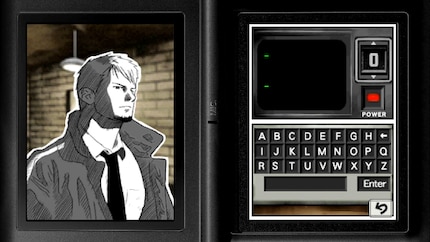
Hotel Dusk: Room 215 is a perfect game because it’s perfectly tailored to the hardware of the Nintendo DS. Any attempt to port the game to another platform or make it better would fail. That’s what makes it so special.
I slip into the role of ex-policeman Kyle Hyde, who spends a night in the eponymous Hotel Dusk and gets involved in a crime investigation. The more I learn about the guests and history of the hotel, the stranger the game becomes.
I have to hold the Nintendo DS sideways while playing, like a book. No wonder – I have to read a lot in Hotel Dusk: Room 215. Between the dialogue with shady guests, I have to solve all kinds of puzzles that literally use all the features the DS hardware has to offer. And in an extremely creative way.
I remember one puzzle where I had to press two dots on the touchscreen at the same time, even though the DS doesn’t support multitouch. I was also completely blown away by a puzzle where I first had to put together a puzzle on the touchscreen, then turn it over to read a note on the back. Sounds simple, but how the hell can I turn the puzzle over without breaking it? The solution: I had to fold and unfold my DS to move the puzzle from one screen to the other and rotate it. Ingenious! There are dozens of other examples I could rave about.
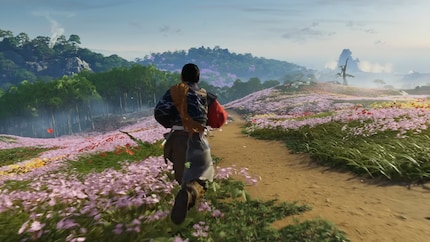
Saving the island of Tsushima from a Mongol siege as Samurai Jin Sakai is repetitive, the story is transparent and the quests are generic. Regardless, I finished the game with a wide smile on my face, despite its objective weaknesses. When red autumn leaves fall from the trees in Ghost of Tsushima and I sneak up to a Mongol camp to kill three enemies with a sword combo, I feel like Jubei in anime classic Ninja Scroll.
Yes, it’s all been done before then done again, but neither Rise of the Ronin nor Assasin’s Creed: Shadows gave me that overpowering feeling of being a samurai. A dream for my inner Weeb.
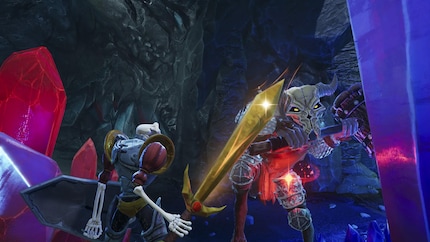
MediEvil is actually just one of many action-adventure games released for the first PlayStation. But for me, it’s one of the most formative games ever. Playing as skeleton knight Sir Daniel Fortesque, I have to put a stop to evil sorcerer Zarok. To do this, I traverse different levels with that Halloween feel. They take place in mausoleums, mystical forests or crystal caves. Fortesque’s comical manner always brightens up the creepy world. I wish more works could convey this eerily funny mood so well.
Levels in MediEvil are varied and offer a wide range of tasks. For example, I master a maze by tackling the challenges set by puzzle master Jack. Or I help the pumpkin witch by cleaning an anthill for her. First she shrinks me down to the appropriate size. Her reward is one of the most powerful weapons in the game: the chicken leg.
The size of the levels is ideal, so I didn’t have to spend too long searching for the numerous secrets. If I defeat enough enemies in a section, I receive a Chalice of Souls as a ticket to the Hall of Heroes. New weapons wait for me there to add some variety to the slaughter. I haven’t enjoyed completing a game as much as this – not even comparable genre representatives like The Legend of Zelda or Kingdom Hearts series. MediEvil is the perfect mix of exploration, puzzles and slaughter.
As a bonus, the PS4 remake has another perfect point. If I complete the remake, including the extra task missing from the original, I unlock the PS1 game on my PS4 disc. How cool is that fan service, come on?
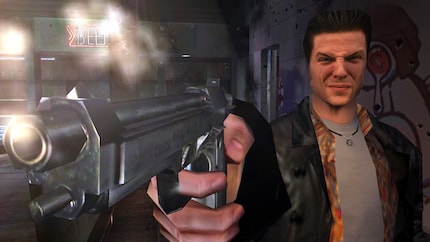
Max Payne is just as epic and influential in the gaming world as The Matrix is for films. And as with Wachowski’s cult film, imitators followed the release for years, desperately copying the concept – mostly failing. Nowhere were action scenes as spectacular as in Remedy’s third-person shooter. When Max, in his black leather jacket and orange Hawaiian shirt, rushes right through a hail of bullets, shooting gangsters in the head in slow motion, it’s hard to beat. It coined the term bullet time like no other game. And I haven’t restarted any other game as quickly after the credits as Max Payne.
John Woo’s Strangehold came closest to this spectacle six years later. But one crucial ingredient was missing. It was the dark story and unusual narrative style that made Max Payne a masterpiece. First Max loses his wife and child in a brutal robbery, then the undercover cop is framed for the murder of a colleague. Much of this is visualised across comic pages, all read by Max. The gripping narrative told by voice actor James McCaffrey, who passed away two years ago, also accompanies me during the game with meaningful and metaphorical monologue. «They were all dead. The final gunshot was an exclamation mark to everything that had led to this point. I released my finger from the trigger, and then it was over.» It still gives me goosebumps today.
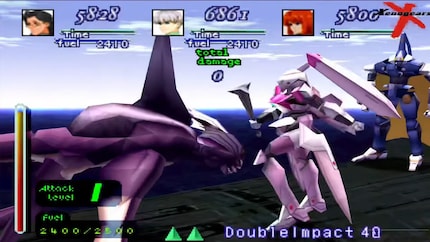
All the games in the Xeno franchise are masterpieces – I’ll just say that, although I haven’t yet played the more recent works Xenoblade Chronicles X, Xenoblade Chronicles and Xenoblade Chronicles 3. But what Tetsuya Takahashi and Soraya Saga created with their debut is simply phenomenal. Especially because the last section of the game doesn’t offer much in terms of gameplay. Due to time pressure during development, it’s more of a visual novel with battles in the usual JRPG style in between. However, this fragmented approach suits the game so well that it still captivates me today.
The story centres on Fei Fong Wong, who suffers from amnesia. His memories only go back three years. At game start, he lives in the tranquil village of Lahan. However, this calm doesn’t last long. A local incident has him mounting a Gear, an oversized robot common in mecha anime. In the process, he loses control and destroys the village. And is promptly banished. After this run of bad luck, Fei doesn’t want to fight any more. Soon, however, he meets others who claim to know his past. He makes friends, and just like that, he and his party are involved in a war. Classic JRPG fare, then.
However, the story is multilayered and subtly conveys various philosophical world views. Xenogears also led me to study philosophy and had a lasting impact on me. Even today, I still like to lose myself for hours in complex analyses of the game.
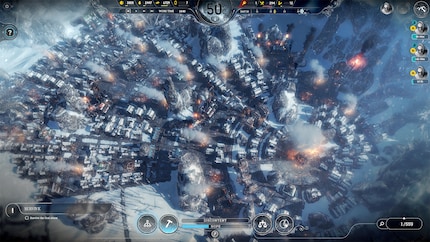
This game’s just the thing for hot summer days. Frostpunk is guaranteed to cool me down – and still make me sweat. In a steampunk setting, I take on the leadership of a small band of refugees from London. The climate has collapsed, the earth’s covered in snow and I have to make sure my people survive in the icy expanse. Practically impossible. There will be deaths. The only question is: how many?
This pseudo city builder presents me with tough decisions. Do I send my people outside at minus 60 degrees to collect coal at the risk of frostbite? Or do I risk the life-giving heat generator shutting down from a lack of coal, leading more to die? Do I mix sawdust into the sparse food or do I stretch it with water? Do I let refugees into my settlement even though resources are scarce? Child labour would help a lot, but do I want that?
You’ll either hate or love Frostpunk. It’s a hard game, a happy ending is highly unlikely, and as the leader you constantly have to test the limits of your own morals. I’ve played through the story several times – the game encourages me to do better in another run. With fewer people on my conscience. To provide more warmth.
Up to now, no other city builder has challenged me as tactically and emotionally as Frostpunk. That’s why it’s perfect for me. Incidentally, some elements from the game can be found in the more recent Ixion, which I also highly recommend.
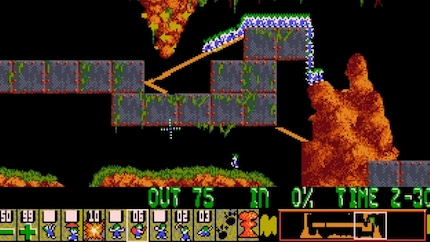
For anyone who (somehow) hasn’t played it: Lemmings is a puzzle game that saw the light of day in the early 90s. You don’t control individual heroes, but a whole column of small, colourful lemmings with green fuzzy hair that constantly charge forward. And that’s exactly their problem: these little animals will march blindly into chasms, lava or spikes if you don’t save them. Your task: equip Lemmings with jobs – digging, building, climbing, using a parachute – so that as many as possible reach the exit. It sounds simple. But it’s ingenious puzzle chaos that quickly mutates into an addiction.
For me, Lemmings was and is the perfect mix of fiddling around, stress, humour and pure madness. Levels are cleverly designed, full of «aha» moments, and triumph when everything suddenly works out – pure bliss. It’s bittersweet, sometimes having to blast a few little guys away to save the group. Sound morbid? Maybe. But it’s also part of the game and makes it all the more special.
At the same time, Lemmings is a journey back in time to my childhood, to squeaky sound effects and hectic mouse clicks. It’s the perfect puzzle game.
What’s your perfect game?
My love of video games was unleashed at the tender age of five by the original Gameboy. Over the years, it's grown in leaps and bounds.
This is a subjective opinion of the editorial team. It doesn't necessarily reflect the position of the company.
Show all